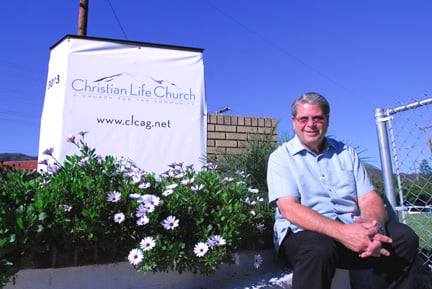Question: Our family is very aware of the drought and we also recycle. Our children, who are now in their teens, have caught on to these practices because as soon as they were old enough we told them that this is helping to take care of our Earth.
Our son, we’ll call Brian, noticed our neighbors watering their lawn for several hours. When the neighbor finally came out to turn off the water, Brian asked him the reason he watered so long. The neighbor didn’t answer him and just went back into his house. Now the neighbors won’t speak to us. Up until now, we’ve gotten along really well. Brian is feeling badly that he even asked the question. We told him not to be concerned but to be careful about correcting other people’s actions.
Any suggestions on how to get back on track with our neighbors?
~ Earth Friendly Citizens
Dear Earth Friendly Citizens,
Neighbors can be very tricky. You can pick your friends but, most often, not your neighbors. You have a couple of options here. If you have their email address you can send them a message apologizing for your son saying that he didn’t realize that he shouldn’t be telling neighbors what to do and that you hope to continue to be good neighbors. You can also make some homemade cookies or buy some sweets, wrap them in some fancy paper with a note apologizing in the same way and put them on the front porch. Who doesn’t like homemade cookies?
If that doesn’t work, continue to be pleasant when you see them and let it go. You can always choose like-minded friends. And remember: you and your children are in the right.

Carolyn Young, Licensed Clinical Social Worker
cjymesalila@gmail.com
Dear Earth Friendly Citizens,
First of all, let me express how great it is that your children are sensitive to protecting our environment. You’ve obviously done a good job as parents in helping your children understand the responsibility that each of us have to do our part to safeguard the limited resources God has given us. And certainly your son shouldn’t feel bad about asking the question. The response he received isn’t on him, but the neighbor. I agree with you that we need to be careful about correcting other people’s actions; however, I find it hard to believe that was his intent when asking the question.
As far as restoring the friendship with the neighbor, I always feel that a personal conversation is the best way to heal broken relationships. Jesus spoke to His followers in Matthew 18:15 about our responsibility to go to those who have offended us or who we have offended.
A straightforward approach might be for you and Brian to go to the neighbors and try to talk with them. Proverbs 15:1 (MSG) reminds us: “A gentle response defuses anger…” Apologies can be powerful. Even though his question wasn’t meant as a correction, it might be helpful for both Brian and the neighbor if Brian takes the initiative to apologize for upsetting them. Be sure Brian also knows it’s not his responsibility to defend his actions. Once again – your neighbor’s response is on him not your son. And it might also be good to remind Brian ahead of time that the neighbor might not respond positively as he would like.
Again, Jesus said, “If he listens, you’ve made a friend!” (Matthew 18:15 – MSG) That’s the outcome you can hope and pray for – but even if your neighbors don’t come around, that experience for Brian will help him in so many other encounters and relationships he will have in life.
I am trusting and praying the outcome will be better than you expect. Blessings and prayers!

Pastor Randy Foster
randy.clc@att.net
Question: Help! We’re a church-going family. We’ve told our kids that God can do anything. They are ages 6 (Johnny) and 8 (Katie). We don’t let them watch the news but one night while we were watching the news, our youngest got out of bed to go to the bathroom. There was a news report about violence in the Middle East and many people, including children, had died. Much to our dismay Johnny saw the report and asked, “If God can do anything, why doesn’t he stop this stuff?”
We really didn’t have an answer but we told him that we have to pray for peace every day. Are we wrong in telling our kids that God can do anything? And how can we put a little mind at ease about what’s happening in the world? ~ Worried Parents
Dear Worried Parents ~
I admire you for not letting your son and daughter become upset through the media by limiting their television access. However, as much as we try to protect our children from unwanted information, there are times that it can’t be avoided. This situation sounds like one of those times.
In my mind, this does not negate the effectiveness of your parenting skills. On the contrary, the fact that your response is concerning to you indicates your devotion to providing your offspring with correct and valuable information.
That being said, your son’s reaction is a typical response in children at this stage of development. Challenging subjects such as this are complex for children to understand because they’re abstract thoughts and ideas. Without the cognitive skills to make sense of suffering, the “why” questions seem amplified and we, as adults, seldom feel we’ve adequately satisfied our children’s concerns or curiosities. We try to help them understand the grace and mercy of God, and then something happens that seems nonsensical. I think your approach using prayer for peace is a beautiful way to help them submit their wonderings to the wisdom of God.
It’s also appropriate to show our vulnerability by responding that we really don’t always know the whys, but we trust that God is a good God and always has our best interests in mind. There’s value in answering their questions honestly, which might mean I really don’t know – a response that assures that you they’re being heard. Then we can reassure them that they’re safe, not in danger like some children, and protected.
Don’t hesitate to point out that we live in a blessed and privileged country but that some children don’t have the same opportunities for care and safety. We are grateful to be in a place that’s safe and comfortable. Expressing our emotions healthfully gives our children permission to feel and express their thoughts and fears, as well as the things for which they’re grateful.
Here are some Scriptures to support God’s faithfulness: “Certainly the faithful love of the Lord hasn’t ended; certainly God’s compassion isn’t through! They are renewed every morning. Great is your faithfulness.” (Lamentations 3:22-23 – CEB)
“Your love, Lord, reaches to the heavens, your faithfulness to the skies. Your righteousness is like the highest mountains, your justice like the great deep. You, Lord, preserve both people and animals.” (Psalm 36:5-6 – NIV)
There are some excellent books to help you with talking about the things of God with your children. Here are a few that may be useful: “A Kid’s Book About God” by Paul J. Pastor, “Dear God, I have a Question” by Kathryn Slattery, “Everything a Child Should Know About God” by Kenneth N. Taylor.
Blessings to you as you seek to help your son understand the mysteries of God. Be present and attentive to his questions, model your faith and encourage him that there’s nothing to worry about, speak honestly and directly, including being transparent about your own questions, and give lots of hugs!
Be well & be blessed!

Lucinda Guarino
lucindaguarino1@gmail.com
Dear Worried Parents,
You’ve asked three questions, two of them are great questions; one, not so great. Here’s what I mean:
Your first question – “If God can do anything, why doesn’t he stop this stuff?” – Johnny zeroed in on a question we all have! Here are three answers.
First, the apostle Peter talks about the coming of Jesus, a day when God will make all things right. “But in keeping with his promise we are looking forward to a new heaven and a new earth, the home of righteousness.” (2 Peter 3:13)
Things won’t always be this way. Joy to the world! Today’s violent world is temporary until Earth receives her king.
Second, for life to be meaningful at all, mankind must be free to choose good or evil. God never created holy robots without freedom. He made us free, able to choose between doing good and bad. Think of the tree in the middle of the Garden of Eden. Our first parents chose freely, poorly. And we’ve been making bad choices ever since.
Third, God is at work right now limiting evil. If you remember the Book of Job, you’ll recall that the devil wanted to kill Job. But God would not allow it. God limits the evil the devil can do. Likewise, Jesus let Simon Peter look behind the curtain of spiritual, unseen things. He said: “Simon, Simon, behold! Satan demanded to have you that he might sift you like wheat.”
But Jesus stopped him. He said, “But I have prayed for you that your faith may not fail.” (Luke 22:32) God redeems the evil in this world for good, all the time.
Your second question – “Are we wrong in telling our kids that God can do anything?” Of course not. The Bible states: “The plans of the Lord stand firm forever, the purposes of his heart through all generations.” (Psalm 33:11)
God can do anything! But God doesn’t do what we think He should. He allows evil to flourish for a time in order to accomplish his plans. Right now the world is free and loaded with evil – but it won’t always be. You already know this, being church-goers.
Your third question is a beauty: “How can we put a little mind at ease about what’s happening in the world?” I can’t help but think of an old hymn, “This Is My Father’s World.” The last verse goes like this: “This is my Father’s world, O let me ne’er forget; That though the wrong seems oft so strong, God is the Ruler yet. This is my Father’s world, the battle is not done; Jesus who died shall be satisfied and Earth and heav’n be one.”
I’ll close with the words of Jesus to frightened disciples: “I have told you these things so that in me you may have peace. In this world you will have trouble. But take heart! I have overcome the world.” (John 16:33)

Pastor Jon Karn
pastorjon@lightonthecorner.org
